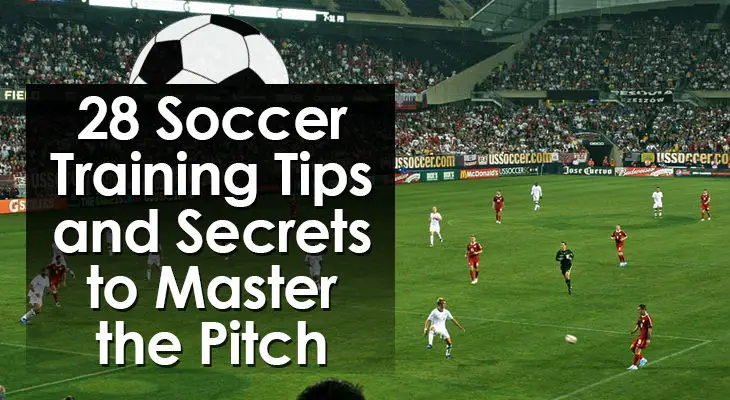28 Soccer Training Tips and Secrets to Master the Pitch
No matter how talented a player is, soccer training is key for development.
Not only will it help you individually, making sure to constantly improve your game with regular training will help your team improve as an overall unit as well.
When a player improves individually, the team improves as a whole.
Soccer training is crucial to learn new skills, practice and perfect new moves, and also to gain confidence in your own abilities.
Whether you’re the team’s star or completely brand new to soccer, there will always be some part of your game that needs improvement.
There’s no such thing as a flawless soccer player.
To make sure that you’re soccer training is effective and you’re making the most of your time, check out some of the way you can take your game to the next level:
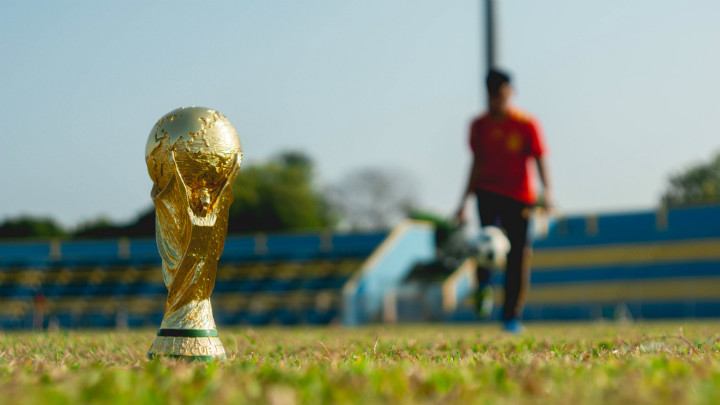
28 Soccer Training Tips
1. Give 100% Every Time You Step on the Pitch
You give complete, all-out effort whenever you’re on the pitch during matches, right?
Players should aim to do the same in any soccer training session.
You will get much more out of your training sessions if you take them seriously and give it your all for every second you’re out there.
By training and practicing at a high intensity, you will be prepared to perform the skills and moves you’ve been working on at that same intensity during games.
2. Make Soccer Training a Top Priority
If you’re giving 100% (as talked about above), then the more training sessions you’re involved in, the more improvements you’ll see.
It’s simple math.
If your team has a training session, you need to make sure you’re there each and every time.
This will not only help your game grow considerably, but it will allow you to improve the chemistry you have with your teammates.
While soccer practice can be time consuming, you need to commit and make room for it in your schedule if you want to improve your skills and understanding of the game.
You must make it a priority.
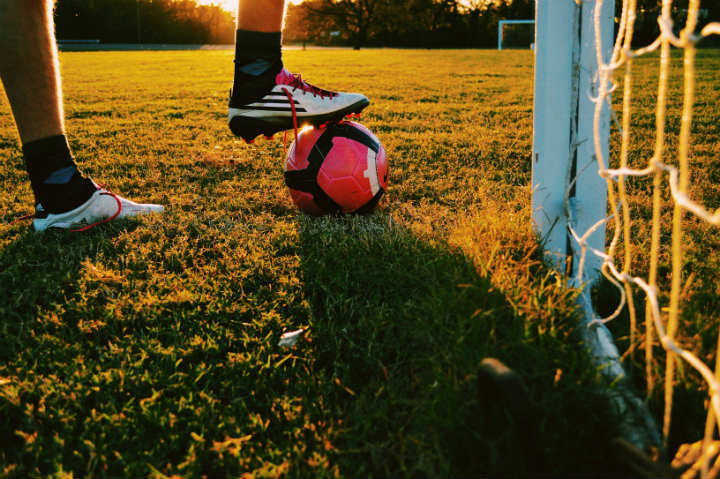
3. Take Responsibility for Your Improvement
Players must take responsibility when it comes to their soccer performance.
Ask yourself these questions:
- Did you prepare adequately before training?
- Did you give everything you had?
- Have you looked for ways you can improve your game?
Soccer is a fantastic sport to play and watch.
Part of the beauty of it is that each player has their own way of playing…
Their own unique identity and combination of skills out on the pitch and this means that everyone has different areas they must improve.
While it’s great when a coach or teammate encourages you to improve specific aspects of your game, the responsibility ultimately falls on you to put in the work to see those improvements.
4. Know When It’s Time to Focus
When it comes to training, some players will joke around throughout sessions without taking drills as seriously as they should.
While soccer is meant to be fun (of course), you need to understand when it’s the right time to have fun and when you should be focused on improving your skills.
Truth be told…
Soccer training isn’t always fun.
Improving is hard. It can be frustrating and requires complete focus.
Players must understand when it’s time to put their head down and focus on getting better instead of mucking around with teammates.
5. Evaluate Your Strengths and Weaknesses
A great way to figure out how you can improve is to sit down and evaluate what you do well on the pitch and which areas of your game require improvement.
If you’re honest with yourself, you can quickly see what you should be devoting time to during training.
You will also start to understand your key strengths which is invaluable out on the pitch so that you can focus on helping the team by doing what you’re good at.
With so many different areas to potentially improve, setting aside time to evaluate will make sure you’re always taking steps in the right direction.
Later on we’ll look at a few actionable ways you can improve your technique and skills as well as your understanding of the game.
6. Seek Out Criticism and Advice
Getting feedback from coaches on your strengths and weaknesses is very useful if you are serious about your personal development.
While it may be hard to hear at the time, your coach should honest and be able to tell you what you do well and where you could improve out on the pitch.
By taking their feedback and advice on board, you can start directing your individual training and workouts to improve areas of weaknesses and further strengthen what you’re good at.
7. Master Your Emotions
Making a silly mistake out on the pitch or taking criticism from a coach can be tough…
Which is why you must be mentally strong.
Sulking or lashing out at your teammates or coach won’t do anything to change improve your performance.
In fact, it will most likely do the opposite…
You’ll quickly find yourself getting annoyed and frustrated which will lead to poor decision making and a lack of effort out on the pitch.
Great players always have their emotions under control in any situation.
8. Study Soccer Tactics and Strategy
Individual skills are important, but they’re not everything…
If a player is unable to function as part of a team or they have no clue about the strategy and tactics of soccer, then they’re not going to get very far.
You must study to understand the game.
Unfortunately, many young players don’t get taught about how the game works at a detailed level so taking the time to study can give you a huge advantage.
Here are a few ways to do this:
- Watch games on TV
- Read soccer strategy / tactics books
- Listen to coaching interviews
- Subscribe to podcasts
All of these resources will give you an opportunity to learn more!
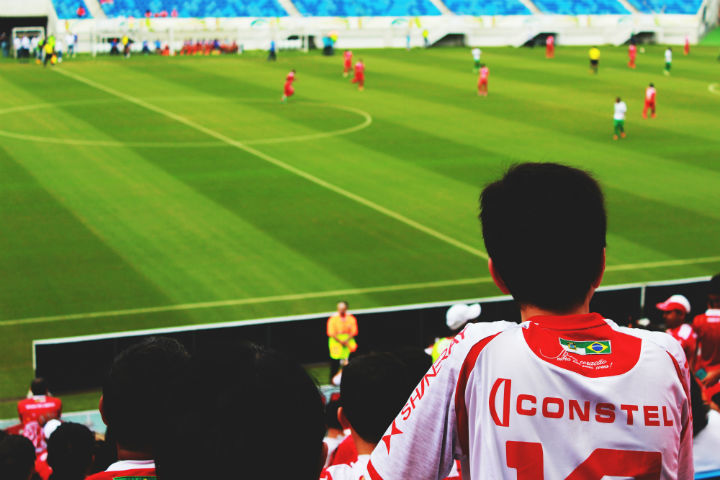
9. Develop in Your Position First
Most players specialise in one position out on the pitch.
Although some positions are easily interchangeable with others, the reality is that you should be looking to develop your skills with a particular area of the pitch in mind.
While there have been some players who have played both as a centreback and a striker throughout their careers, most changeovers don’t involve such a jump.
Once you know your position, you can work out the particular attributes to work on which will give you the biggest chance of success in that role.
But having said that…
In a perfect world, you want to be able to play as many spots on the pitch as possible.
Focus on improving all aspects of your game, but know which parts to give priority to.
10. Always Think About Your Positioning
One of the keys to understanding your position is knowing when and where you should be at any moment during the game.
Being even a metre out of place can spell disaster at critical points during the game.
For example, if you’re a fullback or a centreback, there are several things you need to think about:
- The distance between you and the players to your side.
- The space behind you.
- The space in front of you but behind the midfielders.
If you leave too much space, it may be exploited by the opposition.
Training sessions is the perfect opportunity to work on this as it will allow you to practice communicating with your teammates to make sure all spaces are covered.
11. Talk to Your Teammates Constantly
Speaking of communicating with your teammates…
You need to be constantly letting your teammates know what’s going on around them by giving them a shout if an opponent is approaching them from their blindside.
By remaining in close contact, your team will be more organised and efficient.
Once you’ve found yourself in a bit of space, let your teammates know so that they can pass to you as soon as possible if they receive the ball.
As the old adage goes:
“It's only half a pass if it doesn't have a name on it.”
This means you need to put a name on your pass and let them know whether they've got time to control the ball or whether need to pass it on in one touch.

12. Be Aware of Your Surroundings
A simple way to instantly improve your game is to make sure that you are constantly scanning your surroundings and looking over your shoulder.
This is easy to forget in the heat of a game, but doing so will make it much easier for you to find space and time on the pitch.
It will also help you to sniff out any danger before it arises.
Always keep a close eye on the player you are meant to be marking.
Depending on the position you play, this can give you valuable extra seconds with the ball on offense or end with a goal scoring opportunity for the opposition if you’re defending.
Being aware also helps you to know where to turn and take the ball with your first touch as well as knowledge of opportunities to play the ball forward.
13. Learn How to Lose Your Opponent
Knowing how to wriggle your way past an opponent or to shake them off your tail is a useful to skill to have because it will give you more time on the ball to hurt the opposition.
With the drop of a shoulder or with a deadly feint, you can throw any defender off balance and quickly power away from them.
There are a number of ways to do this...
Some players prefer to use their first touch to take it beyond the opponent’s reach.
Others might choose to control the ball and then weave around their opponent’s missed tackle.
Either way, you must practice receiving the ball under pressure and then maneuvering your way around different opponents.
While this will inevitably come up in your training sessions, you can also work on this with a friend outside of practice.
14. Become Confident in Tight Spaces
With the game of soccer being played at a hundred miles per hour, a crucial skill is learning how to play in tight spaces without much time in control of the ball.
While losing your opponent will help you out on the pitch, in tight spaces your opponent's will soon close down your space again.
To avoid panicking and losing your composure in the face of their aggressiveness, make sure to practice for these situations in training.
A quick first time pass and move into space is often a simple solution.
This demands a lot of you and your teammates as you need to constantly be on the move looking to fill open spaces.
Playing small sided games in training in a limited area will be frustrating for players at first, but they will quickly see improvements to their game.
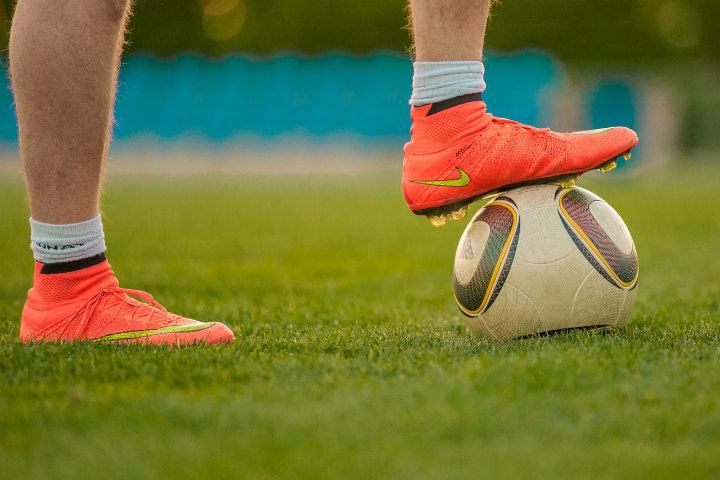
15. Improve Your Passing Ability
Regardless of what position you play, having the ability to pass with accuracy and confidence is important.
Being able to retain possession within the team helps to threaten the opposition while simultaneously preventing the opposition from creating goal scoring chances.
While passing will take up a large part of any training session, you can still work on your passing skills in your own spare time.
Here’s a few ways:
When you’re alone, find a wall and kick the ball against it. Alternating your feet and varying up how you receive the ball once it comes back to you.
With a friend you can vary it up even more by practising long balls, quick short passes, and running with the ball while passing the ball between you.
16. Become Dominant With Both Feet
Every time you train, whether you're performing individual soccer drills in your backyard or at a team training session, make sure you’re practicing skills with your weaker foot as well.
If you do, you’ll quickly become comfortable playing with both feet during games and this is an invaluable skill to have on the pitch.
You never want to miss taking a shot because you can’t use one of your feet.
And you don’t want to lose possession or mess up a pass to a teammate because you aren’t able to control the ball with your weak foot.
It can feel incredibly difficult and awkward when you first start practicing, but once you’ve reached the point where you don’t have to think about it, the benefits are huge…
You’ll have twice as many shooting, passing, and dribbling options during games.
17. Polish Up on Your First Touch and Ball Control
A great first touch is needed when you’re under pressure during games.
If you’re able to calmly receive the ball with control, you prove to your teammates that you’re a reliable outlet when they have the ball.
Whether the ball is in the air, along the ground, arriving with speed, or you’re running onto it…
You need a great first touch to have a future in soccer.
This means being able to control the ball with both feet, your thighs, your chest, and also being able to head the ball under control to a teammate.
18. Tackle Opponents with Precision
No matter what position you pay, you need to know how to tackle.
Some positions may demand it more (centreback, fullback, or central midfield), but all players will find themselves in a position where they need to challenge the ball.
Which is why you must know how to tackle firmy, safely, and fairly.
While occasionally a shoulder challenge is enough, knowing how to slide tackle is important since you may have no other option.
19. Practice Shooting from Different Distances and Angles
As we all know, the team that scores the most goals wins.
And while many teams have managed to win titles based on solid defensive performances, goals are what the fans come to see and they are the main currency of the game.
Being able to put the ball in the back of the net is one of the best skills to have and it’s a blessing to coach players who have this ability.
When training, you want to make sure you’re practicing from a variety of ranges and angles with many different shooting techniques.
Whether it’s volleying the ball from a cross or running onto a through ball and striking it with one touch, there are many ways to shoot the soccer ball.
If you’re not at a team training, you can practice your goal scoring with a friend by alternating who’s going to shoot and who will be keeper.
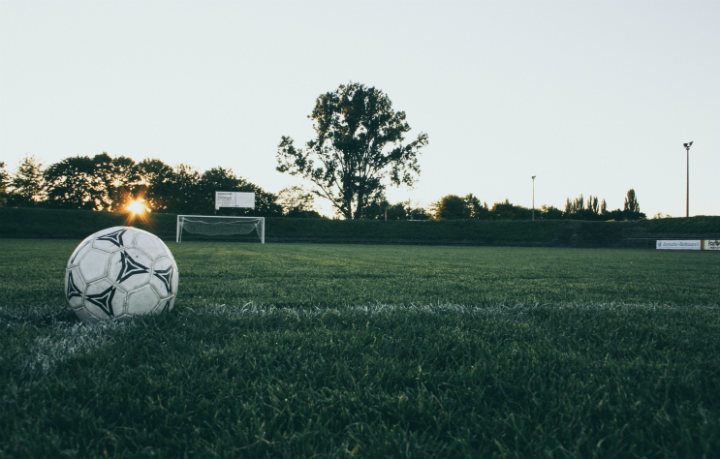
20. Work on Kicking the Ball Powerfully and Accurately
It’s always impressive watching the pros punt the ball the length of the pitch with such precision that it lands on the foot of their teammate.
To do that, a player needs to be able to kick the ball powerfully and accurately.
Your technique is very important when it comes to the mastering the kick so make sure that you’re practicing as much as possible.
When passing or shooting, you may have to sacrifice power for accuracy (or vice versa) but that must be determined on a case-by-case basis throughout a match.
If you can develop both skills, you’ll be able to pull off any pass or shot.
21. Make Sure You Can Head the Ball
There is nothing more infuriating than seeing your teammate duck out of a header.
When you’re playing competitive soccer, you’re expected to be able (and willing) to head the ball if the situation requires it.
Being able to do so is important for every position on the field as heading the ball can help you both to defend and to attack.
In training, you should be practicing heading the ball from corners (attacking and defending), free kicks, and crosses into the box.
Your starting position, timing, and leaping ability are all important factors in determining whether you win the ball in the air or allow your opponent to get there first.
22. Improve Your Physical Strength and Agility
When it comes to winning headers in the air, holding off players while dribbling, or making challenges against an opponent…
Superior strength and agility will give you a significant advantage.
While I won’t go into specific gym workouts in this post, following a regular routine of push-ups, pull-ups, squats, lunges, and sit-ups will give you a great base to work from.
If you’re still fairly young and don’t have someone to show you the ropes, stick to body weight exercises until you’re able to get an expert to show you proper form.
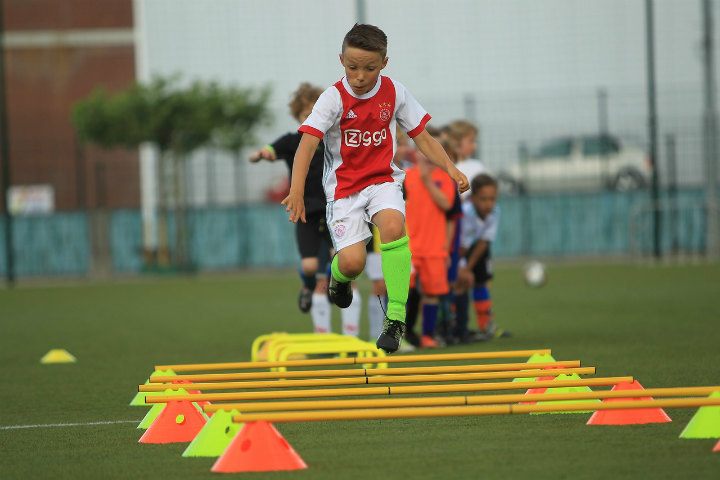
23. Increase Your Stamina and Overall Fitness
You have zero chance of being an impactful soccer player if you struggle to get around the pitch for the length of an entire game.
The best way for a player to Improve their stamina is by working on their fitness outside of team training sessions.
Commit to a routine of regular running. Mixing up long distance running with short distance sprinting for best results.
Being fitter than your opponents gives you a large advantage as you’ll be able to cover more ground and remain focused even towards the end of a game while everyone else is starting to experience heavy fatigue.
When fatigue gets the best of you, you’ll start making sloppy passes and basic mistakes which can potentially cost your team the match.
24. Fuel Your Body With the Right Food
Putting the right fuel into your body is often overlooked by most amateur and youth players.
But it’s crucial if you want to give your best performance time and time again.
Every player must understand what to eat before a training session, when the best time to eat is, and also what type of fluids to drink before, during, and after training.
By planning food and water intake in advanced and cutting unhealthy foods out of your diet, you’ll gain a simple advantage over your opponents.
Especially if they’re eating junk food.
25. Pay Attention to Rest and Recovery
While it can be inspiring to coach a player who’s willing to battle through injuries to help their team, sometimes it’s smarter to rest and recover from injuries.
It’s impossible to train and play at 100% all the time…
Most players will experience both significant injuries and also minor injuries throughout their soccer journey.
Players must understand which injuries are safe to play through and when it’s better for them sit out for a few days / weeks to get better.
This goes for the mental side of soccer, too...
Players will occasionally need breaks from the game to mentally recover. This will keep them feeling fresh and motivated to give their best.
26. Warm Up and Cool Down With Purpose
In addition to improving your diet and working on your fitness, another great way to prepare yourself to perform at your best is to make sure you warm up correctly.
While some players may think it’s a waste of time, warming up your muscles will prepare them for intense exercise.
Stick to dynamic stretches and movements pre-exercise.
And then post-exercise make sure to finish with static stretching and a slow jog.
Make sure to complete a couple of stretches for each part of your body to ensure you’ll be ready to go next practice or game.
27. Play Anywhere and Everywhere You Can
Depending on your coach, modern soccer players are at risk of losing their creativity as many training sessions become far too structured and lack spontaneous play.
Playing small-sided games in the streets with friends can be just as beneficial for development as attending team trainings.
In fact, sometimes they’re even better.
Playing games with friends will improve your close ball control, dribbling skills, ability to deal with different situations during a match, and much more.

28. Be Willing to Put in the Work
Here’s a little truth for you:
None of the tips mentioned above will improve your game if you’re not willing to put in the hard work that improvement requires.
You won’t improve your weak foot without constant practice.
You won’t know your strengths and weaknesses if you’re not willing to sit down with a pen and paper and be honest with yourself.
You won’t improve your fitness if you don’t focus on your eating habits.
You get the point…
If you’re serious about potentially getting recruited to play college soccer, then you need to make sure you’re doing everything you can which will have a positive impact on your game.
Soccer Training Tips Summary:
1. Give 100% Every Time You Step on the Pitch
2. Make Soccer Training a Top Priority
3. Take Responsibility for Your Improvement
4. Know When It’s Time to Focus
5. Evaluate Your Strengths and Weaknesses
6. Seek Out Criticism and Advice
7. Master Your Emotions
8. Study Soccer Tactics and Strategy
9. Develop in Your Position First
10. Always Think About Your Positioning
11. Talk to Your Teammates Constantly
12. Be Aware of Your Surroundings
13. Learn How to Lose Your Opponent
14. Become Confident in Tight Spaces
15. Improve Your Passing Ability
16. Become Dominant With Both Feet
17. Polish Up on Your First Touch and Ball Control
18. Tackle Opponents with Precision
19. Practice Shooting from Different Distances and Angles
20. Work on Kicking the Ball Powerfully and Accurately
21. Make Sure You Can Head the Ball
22. Improve Your Physical Strength and Agility
23. Increase Your Stamina and Overall Fitness
24. Fuel Your Body With the Right Food
25. Pay Attention to Rest and Recovery
26. Warm Up and Cool Down With Purpose
27. Play Anywhere and Everywhere You Can
28. Be Willing to Put in the Work
Conclusion:
As I talked about in the final tip, these soccer training tips and secrets will only improve your game if you commit to taking action.
Make no mistake about it…
Becoming a great soccer player isn’t easy.
It takes hard work, dedication, and a real commitment to improvement to see significant results.
But, if you’re going to go all-in, following the soccer training tips above will give you a major advantage over the competition and will allow you to quickly climb the ladder to success.
Further Reading: 55 Common Mistakes Players Make on the Soccer Pitch

